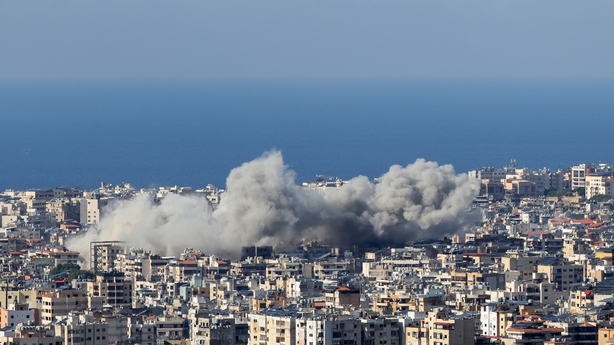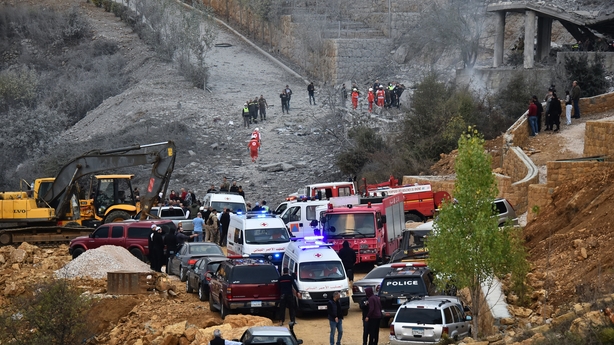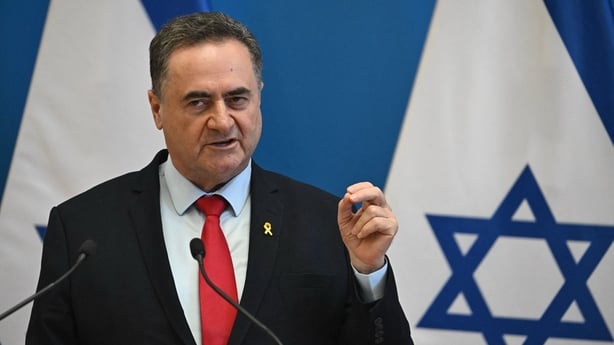Israel's military bombarded Beirut's southern suburbs with airstrikes, mounting one of its heaviest daytime attacks yet on the area after the defence minister ruled out a ceasefire until Israeli goals were met.
Smoke billowed over Beirut as around a dozen strikes hit the southern suburbs from mid-morning.
An Israeli army warning posted on social media told residents they were near Hezbollah facilities. There were no immediate reports of casualties.
In northern Israel, people were forced to take shelter as attack drones were launched from Lebanon, the military said.

One hit the yard of a kindergarten in a Haifa suburb, where the children had been rushed into a shelter, rescue workers claimed. None were hurt.
An Israeli strike killed five people in the village of Baalchmay some 15km southeast of Beirut, Lebanon's health ministry said.
Another person was killed in an Israeli strike in Hermel, in northeastern Lebanon, it said.
Beirut residents have largely fled the southern suburbs since Israel began bombing it in September.
Footage of one strike shared on social media showed two missiles slamming into a building of around 10 storeys, demolishing it and sending up clouds of debris.
The airstrikes destroyed 15 buildings in the southern suburbs, security sources said.
Ignited by the Gaza war, the conflict between Israel and Hezbollah had been rumbling on for a year before Israel invaded Lebanon in September, pounding wide areas of the country with airstrikes and sending troops into the south.

Israel has dealt Hezbollah heavy blows, killing many of its leaders including Hassan Nasrallah, flattening large areas of the southern suburbs, destroying border villages in the south, and striking more widely across Lebanon.
Since hostilities erupted a year ago, Israeli attacks have killed more than 3,200 people in Lebanon, the majority in the last seven weeks, according to the Lebanese health ministry.
Hezbollah attacks have killed about 100 civilians and soldiers in northern Israel, the Israeli-occupied Golan Heights, and southern Lebanon over the last year.
The Israeli military claimed the air force struck around 100 Hezbollah targets in Lebanon, including infrastructure, weapons storage facilities, dozens of militants, and launchers that fired projectiles toward Israel.
'Alarming’ human cost
Israel's new defence minister Israel Katz said yesterday there would be no ceasefire in Lebanon until Israel achieves its goals.
"Israel will not agree to any arrangement that does not guarantee Israel's right to enforce and prevent terrorism on its own, and meet the goals of the war in Lebanon - disarming Hezbollah and its withdrawal beyond the Litani River and returning the residents of the north safely to their homes," he said.
Israeli Foreign Minister Gideon Saar had said yesterday there had been "a certain progress" in ceasefire talks but that the war was not yet over and the main challenge facing any ceasefire deal would be enforcement.
The Lebanese government, which includes Hezbollah, has repeatedly called for a ceasefire based on the full implementation of a UN Resolution that ended a war between the group and Israel in 2006.

The resolution calls for the area south of the Litani to be free of all weapons other than those of the Lebanese state. Lebanon and Israel have accused each other of violating the resolution.
Israel's war has driven more than 1 million people from their homes in Lebanon, causing a humanitarian crisis.
Hezbollah rocket fire into northern Israel has forced tens of thousands of people to evacuate the area over the last year.
Imran Riza, UN Humanitarian Coordinator for Lebanon, said the conflict was imposing an alarming human cost in Lebanon, saying that airstrikes reportedly killed 23 people, including seven children, in a village in Mount Lebanon yesterday.
"On the same day, an airstrike in the city of Tyre killed five siblings from the same family, all of whom had special needs," he said in a statement.

